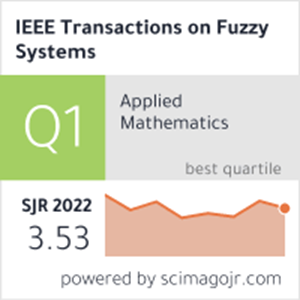网格总线极端故障下微电网的自适应模糊注意力推理控制
IF 10.7
1区 计算机科学
Q1 COMPUTER SCIENCE, ARTIFICIAL INTELLIGENCE
引用次数: 0
摘要
微电网的电能质量由于可再生能源的大量渗透和快速波动而下降。本文提出了一种基于双Q学习(DQL)的自适应模糊注意推理(FAI)方法来控制接入电网的微电网。对具有各自电力电子接口的可再生能源,如光伏(PV)、风能、燃料和微型交流发电机进行了详细的动态建模。该推理方案控制微电网中与电容储能装置耦合的静态补偿器(STATCOM)的相角。STATCOM提供无功功率,而电容存储纠正实际功率不平衡。数值结果表明,在电网母线发生严重的三相对地对称故障时,所提出的控制方案能迅速恢复稳定。基于DQL机制动态调整推理的规则库和对应的隶属函数。将优先体验与浅神经网络奖励模型相结合,对基于时间差异的奖励进行重要采样,有助于克服微电网暂态。所提出的控制优于传统的优化比例-积分-导数(PID)、模型预测和滑模控制方案,可以在不同水平的机电瞬变中恢复转换器的正常运行。本文章由计算机程序翻译,如有差异,请以英文原文为准。
Adaptive Fuzzy Attention Inference to Control a Microgrid Under Extreme Fault on Grid Bus
Power quality of a microgrid falls due to large penetration in renewable sources with rapid fluctuations. This article develops a double Q Learning (DQL) based adaptive fuzzy attention inference (FAI) to control a microgrid connected to the grid. Detailed dynamic modeling is presented with renewable sources such as photovoltaic (PV), wind, fuel, and microalternators with respective power electronics interfaces. The inference scheme controls the phase angle of the static compensator (STATCOM) coupled with capacitive energy storage device in the microgrid. STATCOM provides reactive power, while the capacitive storage corrects real power imbalances. Numerical results showed the developed control scheme restores stability rapidly in the event of severe symmetrical three-phase to ground fault on the grid bus. Rule base and corresponding membership function of the inference dynamically adapts based on the DQL mechanics. Prioritized experience and shallow neural net reward model are integrated where importance sampling of the temporal difference based rewards, contributes to overcome microgrid transients. The proposed control outperform conventional optimized proportional-integral-derivative (PID), model predictive, and sliding mode control schemes to restore normal operation of the converters across different levels of electromechanical transients.
求助全文
通过发布文献求助,成功后即可免费获取论文全文。
去求助
来源期刊

IEEE Transactions on Fuzzy Systems
工程技术-工程:电子与电气
CiteScore
20.50
自引率
13.40%
发文量
517
审稿时长
3.0 months
期刊介绍:
The IEEE Transactions on Fuzzy Systems is a scholarly journal that focuses on the theory, design, and application of fuzzy systems. It aims to publish high-quality technical papers that contribute significant technical knowledge and exploratory developments in the field of fuzzy systems. The journal particularly emphasizes engineering systems and scientific applications. In addition to research articles, the Transactions also includes a letters section featuring current information, comments, and rebuttals related to published papers.
 求助内容:
求助内容: 应助结果提醒方式:
应助结果提醒方式:


